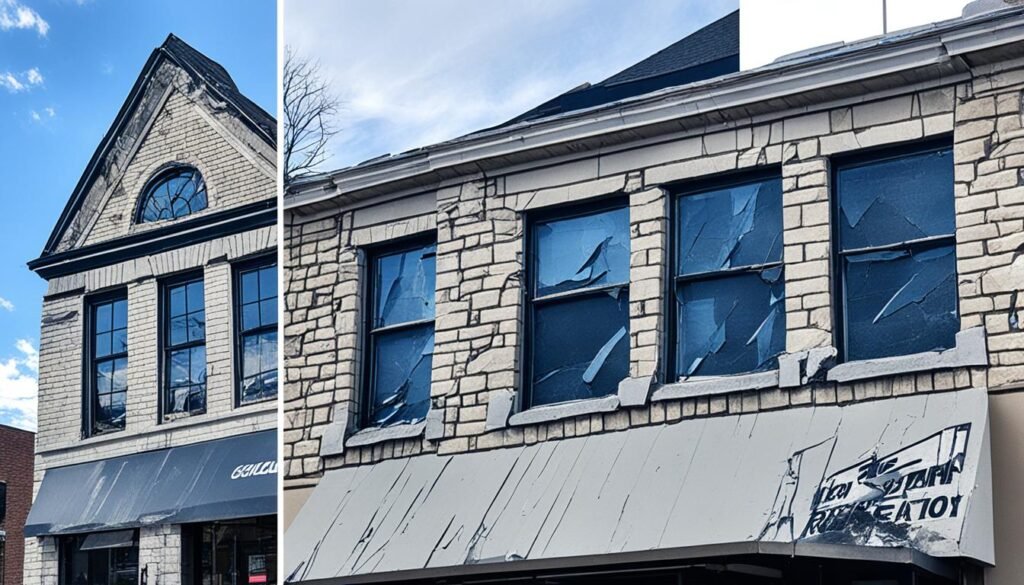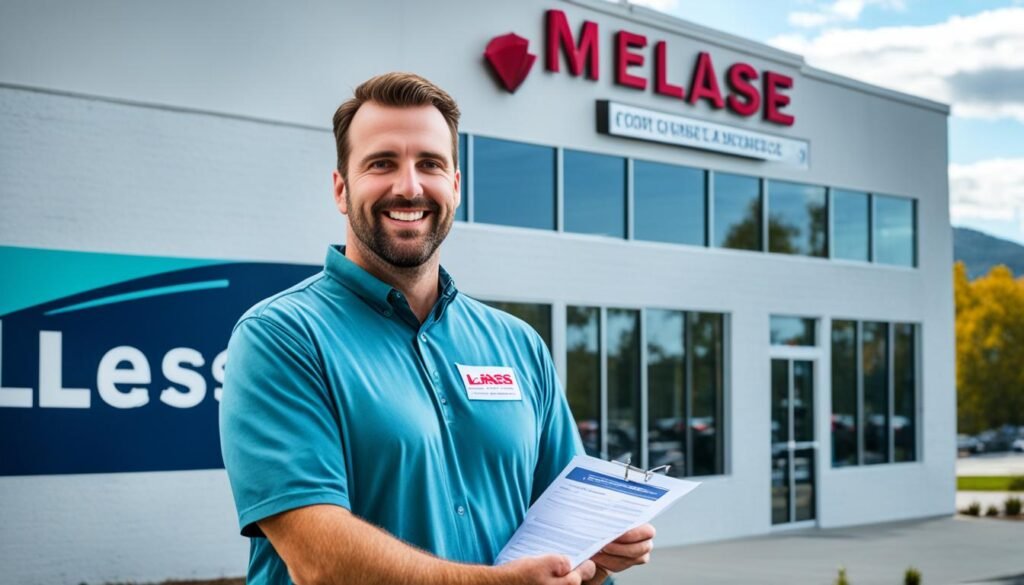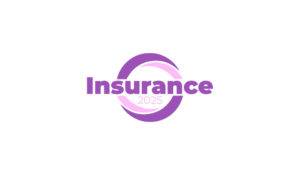Protecting your business assets is crucial for long-term success. But have you ever wondered how you can safeguard your commercial property effectively? That’s where commercial property insurance comes in. Whether you own a small storefront or a large office building, having the right coverage can make all the difference in the event of unforeseen circumstances.
But what exactly does commercial property insurance entail? What types of coverage are available, and what damages are covered? How can you choose the right insurance company and lower your premiums? In this comprehensive guide, we will answer all these questions and more, empowering you to make informed decisions when it comes to protecting your business property.
So, are you ready to dive into the world of commercial property insurance coverage and discover the key to safeguarding your valuable assets? Let’s get started!
Types of Commercial Property Insurance Coverage
When it comes to protecting your business assets, having the right commercial property insurance coverage is essential. There are several types of insurance options available that cater to different aspects of your business, ensuring comprehensive protection. Let’s explore some of the key types of commercial property insurance coverage:
1. Builders Risk Insurance
Builders risk insurance is designed to cover property during construction or renovation projects. It safeguards your investment by providing protection against damage, theft, or vandalism that may occur during the construction phase. This coverage is crucial for ensuring that your project stays on track and remains financially secure.
2. Inland Marine Insurance
Inland marine insurance offers coverage for property that is transported over land or stored at locations other than your primary business premises. It provides protection against damage or loss during transit, including situations such as goods being shipped to customers or equipment being moved between job sites.
3. Cyber Insurance
In today’s digitally driven business environment, cyber insurance is vital to protect your business from cyber-related risks. It provides coverage for losses resulting from cyberattacks, data breaches, and other technology-related incidents. Cyber insurance helps cover expenses such as forensic investigations, legal fees, customer notifications, and reputation management.
4. Cargo Insurance
If your business involves the transportation of goods, cargo insurance is crucial to protect against risks during transit. It covers loss or damage to your cargo caused by accidents, theft, fire, or natural disasters. Having cargo insurance provides peace of mind knowing that your goods are protected every step of the way.
Each of these types of commercial property insurance coverage serves specific purposes, and the right combination will vary depending on your business needs. It’s important to assess your risks, consult with insurance professionals, and customize your coverage to ensure the optimal level of protection for your business.
What is Covered Under Commercial Property Insurance?
Commercial property insurance provides comprehensive coverage for a range of properties, ensuring that your business assets are protected from unforeseen events. Let’s take a closer look at the different types of coverage provided by commercial property insurance:
Building Coverage
Building coverage includes protection for the structure of your building, along with any permanent fixtures, completed additions, and the machinery and equipment that are permanently installed. This coverage safeguards your property against damages caused by fire, storms, vandalism, and other covered perils, providing peace of mind for property owners.
Business Personal Property Coverage
Business personal property coverage focuses on safeguarding the contents of your building. This includes furniture, equipment, machinery, stock, and leased personal property. In the event of theft, fire, or other covered perils, this coverage ensures that the investments you’ve made into your business are protected and can be replaced or repaired.
Personal Property of Others Coverage
Personal property of others coverage is a crucial component of commercial property insurance. It applies to property that is under your care, custody, or control, such as borrowed or customer’s property. With this coverage, you are protected in the event that these items are damaged or stolen while they are in your possession.
“Commercial property insurance provides comprehensive coverage for buildings, business personal property, and personal property of others. It protects your business assets, ensuring that you can recover and continue operating in the event of unforeseen damages or losses.”
With these different types of coverage, commercial property insurance provides a wide-ranging and robust protection for your business assets. Whether it’s the physical structure of your building, the contents within, or the property of others under your control, commercial property insurance offers the peace of mind you need to focus on running your business.
Damages Covered Under Commercial Property Insurance
Under a commercial property insurance policy, various damages are covered based on the causes of loss form. Understanding the different forms can help you determine the specific damages that are covered by your policy.
Special Cause of Loss Form
The special cause of loss form offers the broadest coverage, as it covers all direct physical damage unless specifically excluded. This means that if a cause of loss is not specifically listed as an exclusion in your policy, it is likely covered under this form. It provides comprehensive protection against a wide range of perils and is typically recommended for businesses looking for extensive coverage for their property.
Basic Cause of Loss Form
The basic cause of loss form provides coverage for specific listed perils, such as fire, lightning, windstorm, and theft. This form offers a more limited scope of coverage compared to the special cause of loss form, as it only covers the perils explicitly mentioned in the policy. It is generally suitable for businesses that want coverage for essential risks without additional perils.
Broad Cause of Loss Form
The broad cause of loss form adds additional perils to the coverage provided by the basic cause of loss form. This means that it not only covers the listed perils but also includes additional perils that are specifically named in the policy. It offers a middle ground between the special and basic forms, providing broader coverage than the basic form but not as extensive as the special form.
Reviewing the causes of loss form in your commercial property insurance policy is crucial to understanding the specific damages covered. By familiarizing yourself with the different forms and their coverage, you can ensure that you have the appropriate property damage coverage for your business needs.

| Causes of Loss Form | Coverage |
|---|---|
| Special Cause of Loss Form | Covers all direct physical damage unless specifically excluded |
| Basic Cause of Loss Form | Provides coverage for specific listed perils |
| Broad Cause of Loss Form | Adds additional perils to the coverage provided by the basic form |
Exclusions in Commercial Property Insurance
When purchasing commercial property insurance, it’s crucial to understand the exclusions that may apply. Exclusions define certain risks that are not covered by the policy. Familiarizing yourself with these exclusions is important for adequate protection and to consider additional coverage options if necessary.
“Knowing which risks are excluded from your commercial property insurance policy is just as important as knowing what is covered. By understanding these exclusions, you can take steps to protect your assets from potential losses.”
Flood Insurance Exclusion
One common exclusion in commercial property insurance is coverage for flood damage. Standard commercial property insurance typically does not cover losses caused by flood events. If your property is at risk of flooding, it’s essential to obtain separate flood insurance coverage to protect your business fully.
Earthquake Insurance Exclusion
Similarly, most commercial property insurance policies exclude coverage for damages caused by earthquakes. If your business is located in an earthquake-prone area, it is wise to consider purchasing separate earthquake insurance coverage to ensure comprehensive protection.
Terrorism Insurance Exclusion
Commercial property insurance policies may also exclude coverage for damages caused by acts of terrorism. Given the unpredictable nature of terrorism, it is crucial to evaluate your business’s vulnerability to such events and consider obtaining terrorism insurance for added peace of mind.
Intentional Damage Exclusion
Another notable exclusion is intentional damage. Commercial property insurance typically does not cover damages resulting from intentional acts of destruction or vandalism. This ensures that the policy does not encourage or provide coverage for malicious behavior.
Here is a summary of the exclusions commonly found in commercial property insurance policies:
| Exclusion | Description |
|---|---|
| Flood Insurance | Does not cover damages caused by flooding. |
| Earthquake Insurance | Does not cover damages caused by earthquakes. |
| Terrorism Insurance | Does not cover damages caused by acts of terrorism. |
| Intentional Damage | Does not cover damages resulting from intentional acts of destruction or vandalism. |
Understanding these exclusions is crucial for business owners seeking comprehensive coverage for their commercial properties. By being aware of the potential gaps in coverage, you can take proactive steps to manage and mitigate associated risks.
Additional Coverages for Comprehensive Protection
In addition to the basic commercial property insurance coverage, there are additional coverages available that can provide comprehensive protection for your business. These coverages include:
Business Income Insurance
Business income insurance is designed to protect your business in the event of a business interruption, such as a fire or natural disaster, that temporarily suspends your normal business operations. This coverage helps replace lost income and covers operating expenses during the interruption, allowing you to maintain financial stability and continue paying bills.
Extra Expense Coverage
Extra expense coverage goes hand in hand with business income insurance. It covers additional expenses incurred to minimize the impact of a business interruption. For example, if your primary location is damaged and you need to rent temporary office space, this coverage will help cover the cost of the rental and any extra expenses associated with operating from a different location.
Equipment Breakdown Insurance
Equipment breakdown insurance protects your essential machinery and equipment from mechanical or electrical breakdown. It covers the cost of repairing or replacing the damaged equipment, as well as any income loss resulting from the breakdown. This coverage helps you mitigate the financial impact of equipment failures and ensures that your business operations can continue smoothly.
By considering these additional coverages for your commercial property insurance policy, you can ensure comprehensive protection for your business and minimize the financial risks associated with unexpected events.
| Additional Coverages | Coverage Details |
|---|---|
| Business Income Insurance | Provides coverage for lost income and operating expenses during a business interruption. |
| Extra Expense Coverage | Covers additional expenses incurred to minimize business interruption. |
| Equipment Breakdown Insurance | Protects against damage to machinery and equipment. |
Applying for Commercial Property Insurance
Applying for commercial property insurance is a simple and straightforward process that ensures the protection of your valuable assets. To get started, you’ll need to provide the necessary documentation to prove your property ownership or responsibility for insuring it.
Insurance companies may conduct a property condition assessment to evaluate the pre-insurance condition of the property. This assessment helps determine the risk levels associated with providing coverage and helps insurance providers calculate premiums more accurately.
When preparing to apply for commercial property insurance, it is crucial to present your property in the best possible condition. By doing so, you may potentially reduce your premiums and demonstrate to insurance providers that you take property maintenance and risk management seriously.
Ensure you have the following documentation ready when applying for commercial property insurance:
- Proof of property ownership or responsibility for insuring it
- Property condition assessment reports, if available
- Physical address and legal description of the property
- Details about any security measures in place, such as alarms or surveillance systems
- Information about recent property upgrades or renovations
By providing accurate and detailed documentation, you can streamline the application process and increase your chances of obtaining the desired coverage. Insurance companies rely on this information to assess the risk associated with insuring your property and determine appropriate coverage options.

Remember, the more information you provide, the better insurers can understand your property’s characteristics and potential risks, leading to more accurate coverage and potentially lower premiums. Take the time to gather and organize the necessary documentation to make the application process smoother and more efficient.
Choosing the Right Commercial Property Insurance Company
When selecting a commercial property insurance company, it’s crucial to consider various factors to ensure you find the right fit for your business. By comparing policies, deductibles, and replacement cost coverage, you can make an informed decision that provides comprehensive protection for your property.
Reputable insurance providers in the United States, such as Zurich, Allianz, AXA, and AVIVA, offer a range of commercial property insurance options. These industry leaders have established themselves as reliable and trusted partners in safeguarding businesses against potential risks.
When comparing insurance providers, consider the specific needs of your business. Assess the policies offered by each company to determine which aligns best with your requirements. Look closely at the coverage details, exclusions, and limitations to ensure they meet your specific property needs.
Additionally, inquire about deductibles, which are the amount you’ll be responsible for paying out of pocket before the insurance coverage kicks in. Depending on your risk tolerance and financial capabilities, you may prefer a higher deductible for lower premium costs or vice versa.
Replacement cost coverage is another essential factor to consider. This type of coverage ensures that in the event of a loss, damaged property will be replaced without factoring in depreciation. This is particularly important for businesses with valuable assets that may depreciate significantly over time.
Lastly, seek expert advice when reviewing non-standardized policies or when you have specific concerns related to your industry. Insurance brokers or agents with expertise in commercial property insurance can provide valuable guidance and help you navigate through the complexities of policy terms and conditions.
Comparison of Commercial Property Insurance Providers
| Insurance Provider | Policy Options | Deductibles | Replacement Cost Coverage |
|---|---|---|---|
| Zurich | Various policy options catering to different industries and property types. | Flexible deductible options available to meet your specific needs. | Comprehensive replacement cost coverage to ensure full reimbursement for damaged property. |
| Allianz | Tailored policies designed to meet the unique needs of businesses. | Flexible deductible options allowing customization based on risk tolerance. | Replacement cost coverage available to protect your valuable assets. |
| AXA | Wide range of policy options for different types of commercial properties. | Deductibles to suit your budget and risk tolerance. | Replacement cost coverage for full asset protection. |
| AVIVA | Comprehensive policies offering various coverage options for commercial properties. | Deductibles tailored to your financial capabilities and risk appetite. | Replacement cost coverage to ensure that your assets are adequately protected. |
Consider the table above as a starting point for comparing commercial property insurance providers. Assess the policy options, deductibles, and replacement cost coverage offered by each provider, and choose the one that best meets your business’s unique needs. Keep in mind that the table is not exhaustive, and there are other reputable insurance companies available in the market.
By taking the time to compare policies, deductibles, and replacement cost coverage, you can feel confident in selecting the right commercial property insurance company to protect your valuable assets and minimize potential risks.
Responsibility Division in Commercial Property Insurance
In commercial property insurance, the division of responsibilities can vary between landlords and tenants. It’s important to understand who is responsible for what to ensure adequate coverage and avoid any gaps in protection.
Generally, building insurance is the responsibility of the property owner. This includes insurance coverage for the physical structure of the building, as well as any fixtures and permanently installed machinery or equipment. Building insurance provides protection against damages caused by covered perils, such as fire, windstorms, or vandalism.
On the other hand, contents insurance is typically the responsibility of the tenant. Contents insurance covers the tenant’s business personal property, including furniture, inventory, equipment, and other belongings located within the leased space. This type of coverage ensures that the tenant’s assets are protected in case of theft, damage, or loss.
Public liability insurance is an essential component of commercial property insurance. It covers claims made against both the property owner and tenant for bodily injury or property damage that occurs on the premises. The division of responsibility for public liability insurance depends on the circumstances surrounding the incident.
“Public liability insurance provides peace of mind by offering financial protection against legal claims arising from accidents or injuries that occur on your property. It is crucial for both property owners and tenants to have appropriate coverage to mitigate potential liability risks.” – Insurance Expert
Employer liability is another important aspect of commercial property insurance. It typically falls under the responsibility of the employer, whether the employer is the landlord or the tenant. Employer liability insurance protects the employer against claims made by employees who suffer injury, illness, or damages while working on the premises.
Understanding the division of responsibilities in commercial property insurance is essential for both property owners and tenants. It ensures that all parties involved have the necessary coverage to protect their assets and minimize potential risks.
Factors Affecting Commercial Property Insurance Premiums
Several factors can affect the premiums for commercial property insurance. These include building construction, occupancy, exposure, and security measures. The materials used in the building construction, the nature of the business occupying the property, the geographical location, and the security measures in place can all impact the cost of insurance premiums.
For building construction, the type of materials used can influence the risk of damage and the potential cost of repairs. Buildings made of fire-resistant materials such as concrete or steel may attract lower premiums compared to those constructed with more flammable materials.
The occupancy of the property also plays a role in determining insurance premiums. The nature of the business and the activities conducted within the premises can affect the level of risk. For example, a manufacturing facility with heavy machinery may have a higher risk of accidents or property damage compared to an office space.
Exposure to external risks is another factor considered by insurance companies. Geographical location plays a significant role, as areas prone to natural disasters like hurricanes or earthquakes may result in higher insurance premiums. The proximity to high-crime areas can also impact the risk exposure.
Finally, insurance companies assess the security measures in place to protect the property. This includes factors such as burglar alarms, surveillance systems, access controls, and fire prevention measures. Properties with robust security measures are seen as lower-risk and may attract lower premiums.
Considering these factors and taking appropriate measures to mitigate risks can help businesses secure more favorable commercial property insurance premiums.
“Having a solid understanding of the factors that can affect commercial property insurance premiums is crucial for businesses seeking to protect their assets while managing costs.”
Tips for Lowering Commercial Property Insurance Premiums
Lowering commercial property insurance premiums while maintaining adequate coverage is essential for businesses. By implementing certain strategies, you can potentially reduce insurance costs and protect your assets. The following tips can help you lower your commercial property insurance premiums:
- Enhance Security Measures: Installing a robust security system with surveillance cameras, access control, and alarms can significantly reduce the risk of theft and vandalism. This enhanced security can demonstrate to insurers that you are taking proactive measures to protect your property, potentially leading to lower premiums.
- Mitigate Fire Risks: Implementing fire prevention and safety measures, such as installing fire suppression systems, conducting regular maintenance of electrical systems, and training employees on fire safety protocols, can help mitigate the risk of fire and minimize potential damages. Insurers may offer lower premiums to businesses with effective fire risk mitigation measures in place.
- Bundle Insurance Policies: Consider bundling your commercial property insurance policy with other business insurance policies, such as general liability or business interruption insurance, with the same insurer. Insurance companies often provide discounts for bundling policies, resulting in lower overall premiums.
- Maintain a Good Claims History: A history of frequent insurance claims can increase your commercial property insurance premiums. Taking steps to prevent accidents, implement safety protocols, and address any issues promptly can help maintain a positive claims history and potentially lead to lower premiums.
Implementing the above strategies can contribute to lower commercial property insurance premiums, resulting in cost savings for your business. By enhancing security measures, mitigating fire risks, bundling insurance policies, and maintaining a good claims history, you demonstrate to insurers that you are a responsible business owner and reduce the perceived risk associated with insuring your property.
Conclusion
Commercial property insurance plays a vital role in protecting your business assets and ensuring continuity. With a clear understanding of the available coverage options, damages covered, and exclusions to consider, you can confidently select a policy that suits your needs. It is also important to explore additional coverages for comprehensive protection and choose a reputable insurance company that offers tailored solutions.
When considering commercial property insurance, remember to review your responsibilities and seek expert advice when necessary. By taking proactive steps to secure the right insurance coverage, you can effectively safeguard your investments and minimize potential risks to your business. Asset protection is not just a priority, but a strategic decision that contributes to the long-term success of your organization.
Protecting your business with comprehensive commercial property insurance coverage provides peace of mind. By addressing potential threats and understanding your policy’s terms, you can mitigate risks and focus on growing and expanding your business. Don’t wait until an unfortunate incident occurs; take action now to secure the necessary protection for your valuable assets.
FAQ
What is commercial property insurance coverage?
Commercial property insurance coverage is a type of insurance policy that protects businesses from financial losses due to property damage or loss.
What does a business property insurance policy cover?
A business property insurance policy covers various types of property, including buildings, business personal property, and personal property of others.
What is commercial real estate insurance?
Commercial real estate insurance is another term for commercial property insurance, which provides coverage for commercial properties like office buildings, retail stores, and warehouses.
What is property and casualty insurance?
Property and casualty insurance is a type of insurance that provides coverage for property losses and liability risks.
What does a commercial insurance policy typically include?
A commercial insurance policy typically includes coverage for property damage, liability, and business interruption.
What types of damages are covered under commercial property insurance?
Commercial property insurance covers damages caused by various perils, such as fire, theft, vandalism, and natural disasters like hurricanes or earthquakes.
What are some common exclusions in commercial property insurance?
Common exclusions in commercial property insurance include flood, earthquake, terrorism, intentional damage, war, and military action.
What are some additional coverages available for comprehensive protection?
Additional coverages for comprehensive protection include business income insurance, extra expense coverage, and equipment breakdown insurance.
How do I apply for commercial property insurance?
To apply for commercial property insurance, you need to provide documentation proving property ownership or responsibility for insuring it.
How do I choose the right commercial property insurance company?
When choosing a commercial property insurance company, compare policies, deductibles, and replacement cost coverage. Consider reputable providers and seek expert advice if needed.
Who is responsible for building insurance in commercial property?
Building insurance is typically the responsibility of the property owner.
What factors can affect commercial property insurance premiums?
Commercial property insurance premiums can be affected by factors such as building construction, occupancy, exposure, and security measures.
How can I lower my commercial property insurance premiums?
You can lower your commercial property insurance premiums by enhancing security measures, mitigating fire risks, bundling insurance policies, and maintaining a good claims history.



